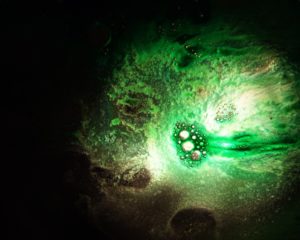Break down contaminants using Enhanced Bioremediation
Enhanced in-situ bioremediation, or ISB, involves the injection or addition of microorganisms (e.g., fungi, bacteria, and other microbes) or nutrients (e.g. oxygen, nitrates) to stimulate microbial degradation. It can be accomplished through direct injection, blending methods, or permeable reactive barriers.
The process occurs through a transfer of electrons from one substance to another resulting in usable energy for the microorganisms. This transfer of electrons requires a “donor” material or “food source” and an “acceptor” material. In natural uncontaminated systems, food sources are limited which causes a competition among indigenous microbial populations for available electron donors. Enhanced bioremediation attempts to restore the balance in the natural system by adding nutrients and donor substrates for consumption by the microbes.
 Petroleum products are commonly reduced aerobically. They typically act as electron donors and quickly degrade if an adequate supply of electron acceptors is introduced into an aquifer system. Thus, a “treatment train” is created using ISCO and aerobic bio-stimulation.
Petroleum products are commonly reduced aerobically. They typically act as electron donors and quickly degrade if an adequate supply of electron acceptors is introduced into an aquifer system. Thus, a “treatment train” is created using ISCO and aerobic bio-stimulation.
Chlorinated solvents, however, are poor electron donors but can act as electron acceptors and degrade under anaerobic conditions. Therefore, they are treated anaerobically. As the donor substrate is metabolized under anaerobic conditions, an electron (hydrogen ion) is released and used to replace a chlorine atom attached to the carbon chain for the chlorinated solvent. This process is known as reductive dechlorination and is deemed complete when the chlorinated hydrocarbon is reduced to ethene or ethane and chloride. Reductive dechlorination is accomplished with lactose, soybean oil, and other low-level microorganisms or nutrients.
Advantages of enhanced bioremediation often include lower cost, effectiveness on low concentrations, and ease of application. Limitations include limited effectiveness on sites with NAPL and elevated contaminant concentrations, slower reactions due to microbial processes, and ineffectiveness on some compounds.
Ready to close your site?
Eden Remediation can help you close a site with enhanced bioremediation. Contact us to get started with these suggestions:
- Start with a good estimate of cleanup mass and volume
- Choose the right chemistry and application
- Treatability testing may be beneficial
- Design a “best-fit” strategy (“zoned” treatment approach)
